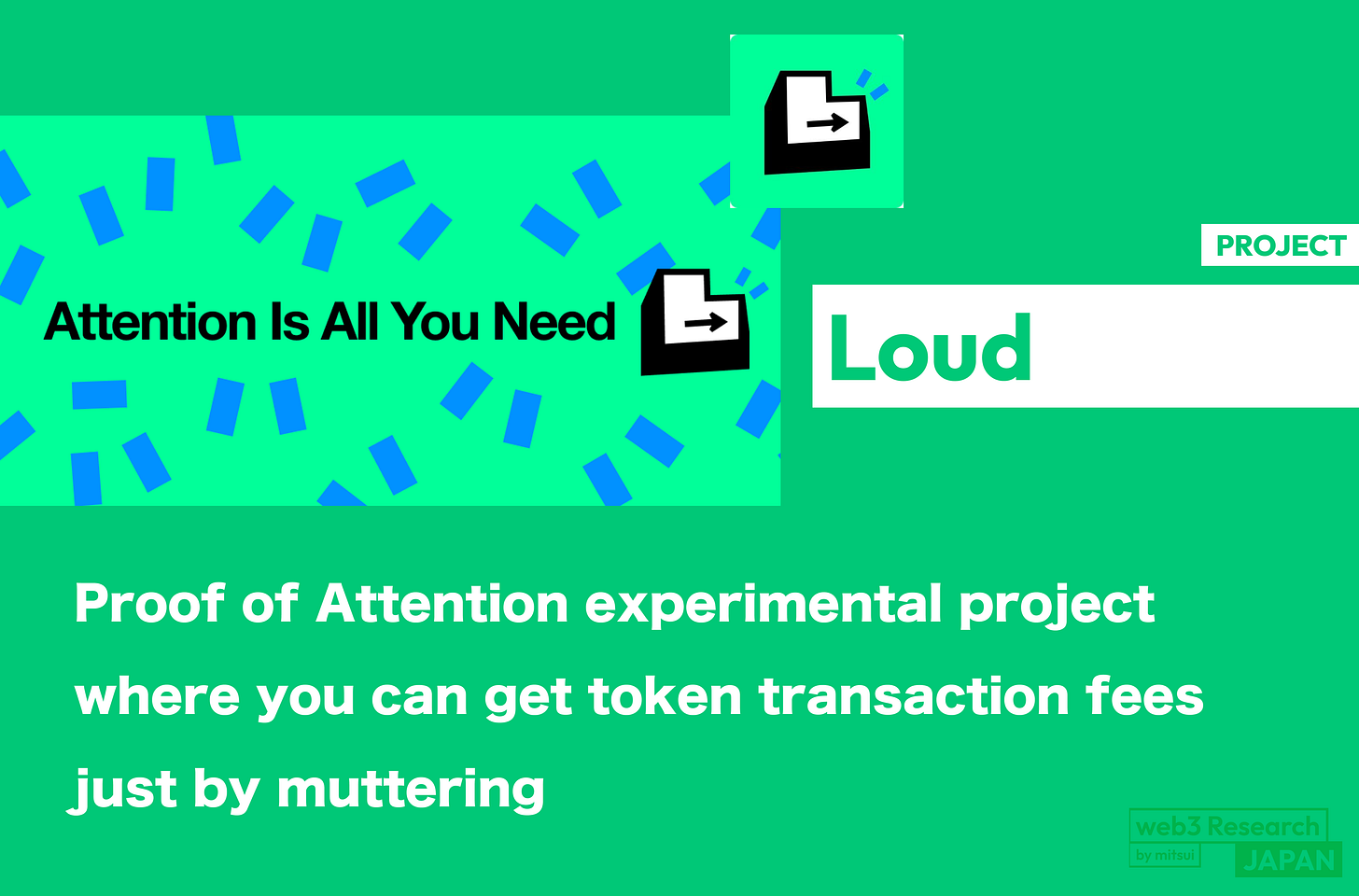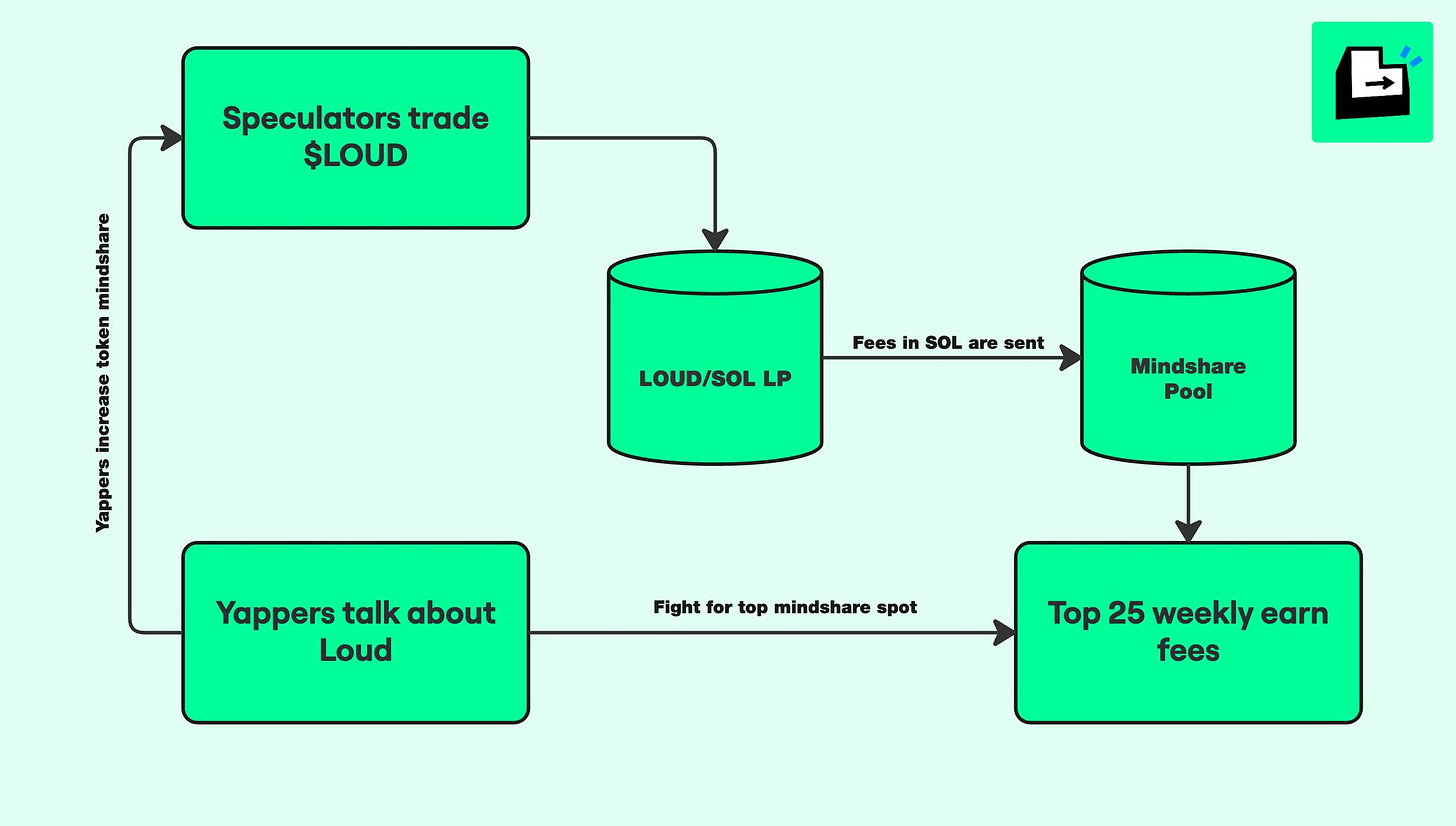【Loud】Proof of Attention experimental project where you can get token transaction fees just by muttering / Using Kaito's Yaps / InfoFi Chapter 2 / @stayloudio
This is a very interesting initiative, the second chapter of InfoFi.
Good morning.
This is mitsui, a web3 researcher.
Today, I researched about "Loud".
🧵TL;DR
LOUD is an experimental project that awards SOL rewards to those who create a buzz about the $LOUD token on social networking sites, based on the amount of attention they receive.
4% of the $LOUD token transaction fee on Solana will be pooled weekly, and 72% of that fee will be distributed to the top 25 mindsharers.
The Yaps algorithm provided by Kaito AI will score the volume, engagement, and quality of posts on X to calculate Mindshare.
Utilizing Kaito AI's "Proof of Attention" model, the more attention your project receives, the more it is promoted, creating a perpetual reward cycle.
📣What is Loud?
LOUD.is an experimental initiative born out of the idea, "What would happen if we rewarded people permanently for talking about a particular token?"What would happen if we rewarded people for talking about a particular token forever?The system distributes token rewards to people who have gained attention on social media.The concept will be announced on May 27, 2025.
The concept was announced on May 27, 2025, and created quite a stir, with a series of presales and TGEs that quickly became the talk of the town.
Let's take a look at the details.
The "#LOUD" token will be issued on Solana with a 4% transaction fee (transaction fee) on each $LOUD token (managed by Meteora), and the fee income will be returned to the community each week.
Users post about the #LOUD tokens on X and earn points (mindshare) based on the response.This response is then ranked as "Mindshare" using a proprietary algorithm provided by Kaito AI, which visualizes and scores the volume and engagement on social networking sites.The top 25 users in Mindshare for each week will automatically receive a SOL reward equivalent to 72% of the aforementioned transaction fee pool.
Here is how it works.
The $LOUD Trading Fee accumulates in the LP Pool
The fees are sent to the Mindshare Pool as SOL
The top 25 people each week will receive a deal fee.
To be in the top 25, you'll have to tweet about Loud, which will increase awareness of the project.
Increased awareness will increase the token price and transaction volume
As transaction volume increases, transaction fees increase
→Infinite loop
All of the current rankings and the transaction fees that will be rewarded are available on the website.
Also, I mentioned earlier that the top 25 will receive SOL rewards equal to 72% of the transaction fee pool, and the remaining 28% will be distributed with 18% going to Kaito staking users and 10% to the token issuer.
🟢Premise: What is Kaito AI?
LOUDis a project focusing on attention on SNS called "Proof of Attention".However, the underlying project is "Kaito AI".
Kaito AI is a web3information platform founded in 2022.It provides a crypto-version search engine that integrates and indexes vast amounts of scattered crypto asset-related data (social media posts, technical blogs, forums, research papers, podcast audio, etc.) using AI to provide users with instant and useful insights.
The main products are "Kaito Pro" and "Kaito Connect," with "Kaito Pro" offering the so-called above data on a subscription basis.
However, the most recent focus of attention is "Kaito Connect.This is a decentralized incentive network that adds value to community participation and information sharing.Also known as "InfoFi," it operates a platform that provides visibility to those who are disseminating valuable content and information.
The platform is called "Yaps" and offers Kaito's proprietary Attention Tokenization algorithm that quantifies a user's information dissemination activity and awards points based on their contribution.
The following three main factors are considered in the calculation of Yap points
VolumeVolume: The amount of useful postings made.Evaluate the degree of regular and ongoing information sharing, not simply the number of posts.
EngagementEngagement: the quality of responses and interactions from other users.Not only the number of retweets and likes, but also whether it actually generated discussion.Meaningful interactionWe emphasize the importance of
SemanticsSemantics: The relevance and usefulness of the content of a post.Large-scale language modeling (LLM) analysis weeds out spammy, low-effort posts and considers the insightfulness and uniqueness of the content.
Users can participate in the program by connecting their X account to Kaito Yaps, where they can check their Yap point total and rank.
Loud uses this very Yaps mechanism, with Kaito's Yaps rating engine serving as the oracle to measure "who got the most out of the project" in Loud.
🚩Transition and Outlook
The founder of LOUD is "0x_ultra", a prominent user in the Kaito community. 0x_ultra is a regular top-ranked user of the "Yapper" mindshare ranking on Kaito, and in the past he was a co-founder of the "Jones DAO" protocol on Arbitrum.He is also a co-founder of the Jones DAO protocol on Arbitrum.
The concept was presented on X on May 27, 2025.
This concept was inspired by both the game theory concept "(3,3)" proposed by Olympus DAO, which states that if all participants act in a cooperative manner (win-win), the total profit will be maximized, and the idea of returning transaction fees to users through Believe.The concept was influenced by both the idea that total profit is maximized when all participants act in a cooperative manner (win-win) and the idea that trading fees are returned to users by Believe.
The idea created quite a buzz, and a presale was soon conducted on HoloLaunche, Hologlam Labs' token launchpad.The tokens were launched using a method accurately described as "Initial Attention Offering (IAO)," and a limited pre-sale-like sale was conducted and TGE'd in two phases.
In Phase 1, top contributors who were particularly active in spreading the word about LOUD (e.g., top Yapper ranking on Kaito) were offered a priority quota of up to 0.2 SOL per person for the first 1,000 wallets, and in Phase 2, SolanaIn Phase 2, approximately 120,000 wallets with a certain number of "smart followers" (10 or more) linked to the Solana platform were eligible to purchase up to 0.2 SOL per person, also on a first-come, first-served (FCFS) basis.
The final result was a collection of 1015 SOLs against 400 SOL applications.
Token allocations are as follows, with no team share.
Tokens are already TGE and FDV at time of research was $12.5M.
There is no specific roadmap for the future of the program, as it is highly experimental and the rules for distribution have been established.However, there may be some movement in the future depending on the governance vote, such as changes in the fee rate to be distributed.
💬Chapter 2 of InfoFi begins
The last part is a summary and discussion.
Personally, I find "Loud" very interesting.No, I would rather describe everything as interesting, but I felt that this is one of those mechanisms that has great potential.
As mentioned in the Loud concept, this is certainly a trend that Believe has triggered.It is a trend to grow projects by issuing tokens and returning the fees and incentives to the users in a dynamic smaCon.
In that article, I also wrote that this will be a trend that will be implemented in many projects in the future.
However, I feel that "Loud" is the easiest example of such an implementation.I mean, I was personally skeptical of InfoFi's potential for a permanent token economy, but if this kind of collaboration takes place, it seems like it could be a very big possibility.
I will actively support a project if I can get a transaction fee (or some other reward or incentive) for mentioning my project.The project side is inexpensive if you consider it a marketing expense, and above all, since it is a performance-based compensation (transaction fees are shared only for the amount of excitement), it will grow autonomously without pain.
I thought this "Loud" system could be implemented in all web3 projects in the future.A mechanism like 10% of the transaction fee will be allocated to the top 20 people each week via Kaito is conceivable, and this may help spread the project.
This process would start the second chapter of InfoFi and make the attention on X even more significant.Naturally, hacks will start, and people may start mumbling anything for rewards, but I think that will eventually be weeded out, and we will see a decentralization of marketing, with rewards returned to those who are genuinely supporting the project, and to the initial fans.
We will continue to watch this trend with great interest, including Loud.
This is my research on "Loud"!
🔗Reference Link:HP / X
Disclaimer:I carefully examine and write the information that I research, but since it is personally operated and there are many parts with English sources, there may be some paraphrasing or incorrect information. Please understand. Also, there may be introductions of Dapps, NFTs, and tokens in the articles, but there is absolutely no solicitation purpose. Please purchase and use them at your own risk.
About us
🇯🇵🇺🇸🇰🇷🇨🇳🇪🇸 The English version of the web3 newsletter, which is available in 5 languages. Based on the concept of ``Learn more about web3 in 5 minutes a day,'' we deliver research articles five times a week, including explanations of popular web3 trends, project explanations, and introductions to the latest news.
Author
mitsui
A web3 researcher. Operating the newsletter "web3 Research" delivered in five languages around the world.
Contact
The author is a web3 researcher based in Japan. If you have a project that is interested in expanding to Japan, please contact the following:
Telegram:@mitsui0x
*Please note that this newsletter translates articles that are originally in Japanese. There may be translation mistakes such as mistranslations or paraphrasing, so please understand in advance.













